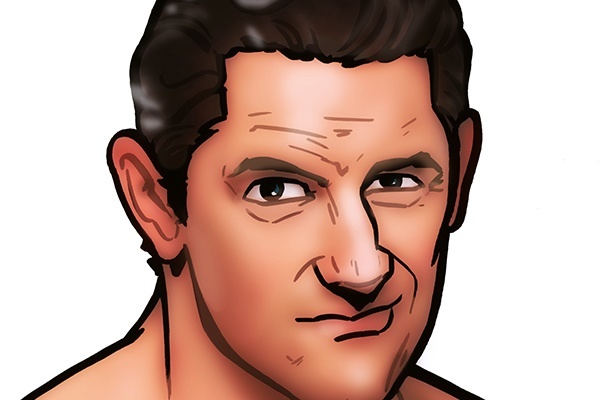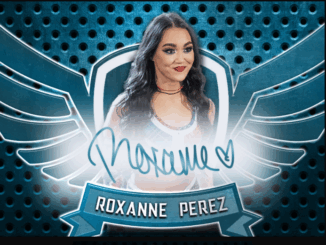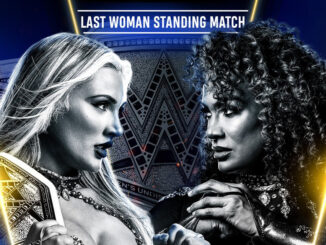
SPOTLIGHTED PODCAST ALERT (YOUR ARTICLE BEGINS A FEW INCHES DOWN)...
AceOdds recently sat down with professional wrestling commentator, actor, and retired wrestler Wade Barrett. They sent the following transcript to PWTorch…
QUESTION: John Cena and other WWE wrestlers have been campaigning for WrestleMania to go overseas. As an England native, what makes the UK a perfect host for Mania?
WADE BARRETT: Well, I would say WrestleMania in the UK would be the ultimate dream for all of us Brits who are associated with this industry. We clearly have the infrastructure. There are a lot of countries out there that we love going to, but you turn up and maybe the facilities aren’t top level. Maybe the roads, the hotels, maybe the building itself isn’t capable of hosting a top-level event like a WWE WrestleMania. In the UK, we already have that. We have everything in place that you can just sign the contract and get it done.
But I think more than anything else, I think we have this vocal fan base. And I would say it extends outside of the UK too. Even the French, as we saw in Lyon at Backlash a few months ago, were absolutely wild. I think the Germans are going to be crazy. We do Berlin at some point in September, I think. So, I think the whole European or Western Europe fan base would descend upon somewhere like Wembley Stadium or Spurs Stadium or the Millennium Stadium in Cardiff, Principality as it’s called now and I think it would be huge. Just the noise, the sound, and the passion that the fan base will have would make it a very special occasion. So, I hope it happens at some point. I’ve no doubt we’re going to get huge, huge premium live events over there. Whether it’s going to be at WrestleMania, I don’t know, but the way things are going at the moment. I think it’s increasingly likely that we could end up over there.
QUESTION: Few fans will remember that you, wrestling under the ‘Stu Sanders’ moniker at the time, formed ‘The Empire’ tag team with Drew McIntyre early in your FCW days.
What area has Drew grown the most in the years since and has he portrayed the UK in WWE well?
BARRETT: Back when we were the Empire, we were a tag team in Florida Championship Wrestling. So, this would have been about 2008, 2009, something like that. Drew at that point in time, we kind of just moved over from the UK. I’m about five or six years older than Drew, I think. This doesn’t sound like much now, but back when I was probably 27 and Drew was maybe 21, that’s a huge difference in life experience more than anything. So, I’d moved away from my parents’ house. I’ve had a career in the UK, working in London and working in offices, being a manager and kind of being a grownup. Whereas Drew had never left his parents’ house. He’d kind of done some stuff in university, but he was still a kid.
So, I very much felt when we were living together and working together, I was almost like a big brother role for him because he would be making some mistakes and doing things wrong. The most noticeable thing for me has been just the growth of Drew away from the cameras and the kind of man he has become and the kind of leader he has become. He’s just a no-nonsense guy. At this point, he’s completely focused. So that’s something I personally noticed in the difference from the days of the Empire to today.
And I think everybody who’s a fan has seen the growth of Drew from when he first debuted on SmackDown in 2008 with Dave Taylor all the way through to now. It’s night and day. It’s a different person. Physically, he looks completely different, but just his confidence, his poise on the mic, his brilliance in the ring, just seeing that growth of him as a man and a performer over the last 15 years has been really cool to watch as a friend and as a fan of Drew.
I think Drew has been fantastic. I think he’s one of those guys who can do it all. He can be the big hero as we saw in Glasgow and the whole city or whole country is going nuts for him. He can be the most vile human being imaginable, which is what we saw a few days later in Chicago at CM Punk’s home. And he really is fantastic in the ring. He looks great. He’s a complete pro when it comes to representing WWE in the media and then on the mic, I think in the last 12 months, Drew has hit a whole new level on the mic where he’s potentially the number one guy in the entire industry when it comes to talking.
I would say historically that was Drew’s biggest weak point, especially when we first moved over to the U.S. He wasn’t confident on the mic. He had a lot of difficulties with his accent. People couldn’t understand him. I was having to translate for Drew when we’d be going into restaurants and things like that but his growth in all areas has been massive. And I think he’s the perfect guy to have become the first-ever British WWE World Champion. I think they knocked it out of the park with that guy and he’s going to keep on getting better and delivering over the next few years.
QUESTION: You also worked with Cody Rhodes, back in the ill-fated ‘Stardust’ days. Did you know he would be a future world champion at the time? Could you have ever imagined that he’d become ‘The Man’ of the company?
BARRETT: So, I’ll say this about Cody and I worked a lot with his father, the American Dream, Dusty Rhodes, is the guy I owe a lot to. I’ve always been a big fan of Cody Rhodes, the performer, even in 2008, and 2009. And then when I started working with him in 2011, 2012 kind of period, we tagged up and did a couple of, I think we did a Survivor series together and maybe a Summer Slam together as a tag team. He’s the guy to me who’s always been brilliant. And that potential has always been there. I think with Cody, the biggest thing he was lacking maybe 10 years or so ago was an opportunity. I don’t think people in management looked at Cody and saw him as a guy who could be capable of pulling the entire train.
So, I think the potential was always there but once an opportunity came along Cody grabbed every opportunity that came his way after about 2015 and he’s just gone from strength to strength.
Did I ever foresee him being the number one guy in the entire industry? I can’t honestly say I did because it’s so rare that anyone gets to that level. If you look over the last 10 or 15 years in our industry, you can perhaps only say Randy Orton, John Cena, Roman Reigns, Cody Rhodes. They are probably the four who’ve actually achieved that level of superstardom. So no, I didn’t see that coming. I absolutely thought he’d be capable of it, but it needed to be a perfect storm of opportunities and then Cody being motivated enough to make them count. And thankfully all those things happened.
QUESTION: Back in 2015, you became WWE royalty by winning the King of the Ring tournament. How will wearing the crown impact this year’s winner, Gunther? Is he ready to become a full-time main event player?
BARRETT: So, I think as long as this year’s winners, Gunther and Nia Jax, do everything completely differently from how I did it, they will do really well. So, one of the cool things we mentioned was the Triple H era a little earlier, one of the cool things for me about this Triple H era is that things aren’t wasted. And I think when I won King of the Ring in 2015, and probably for a couple of King of the Rings prior to me like Seamus had it, a couple of other guys had it too. I don’t think anyone ever really capitalized on that. And that was management decision-making. “Hey, we’ve put this crown on this guy. This guy is the king of the ring. Are we going to highlight him?” No, we’re not. We’re going to move on. We’re going to have this guy go out and kind of compete in what I felt were meaningless feuds and very little storytelling and very little to really hook viewers in. But I think this is a very different era, as I mentioned. And I think Gunther and Nia Jax are going to have really, really strong 12 months with the King and Queen of the Ring behind them and I think the current creative crew and the management team are going to make sure of that. So, I’m really excited to see where those guys go and I’m glad that the King and indeed Queen of the Ring tournaments have got this added shine to them, added gloss to them, which they deserve. Because it’s a great achievement, it’s a great accolade, it’s got tremendous history. And now I think we’re going to maximize that.
QUESTION: After spending most of your adult life in the professional wrestling business, what are your feelings on Logan Paul joining the WWE and becoming a champion so quickly? Is it deserved? Does it bother you at all that Paul, who didn’t have the same journey to WWE as you, is being pushed heavily?
BARRETT: So normally when guys from the outside come in and try and compete in our industry, it is an embarrassment. It’s normally pretty obvious that these guys are not very good. It’s pretty obvious that we’re having to kind of roll out the red carpet and make sure they look good, usually at the expense of the guys who are dedicating their lives to being in the ring and they’ve trained for years. So that’s a historic thing. I don’t think we’ll ever do that again. Not in this era anyway, because someone like Logan Paul has come in and he’s got this tremendous number of eyeballs on him from the outside world. So business-wise it makes sense but what has impressed everyone is A, his natural athleticism and B, more importantly, Logan Paul’s work ethic. In the matches he’s put on since coming in, I think he’s only had five or six matches. Every single one of them has been outstanding. And I’ve been lucky enough to be ringside calling a couple. Probably his biggest match of his career, I would suggest was against Roman Reigns at one of the crown jewels a couple of years ago.
No one knew just how good Logan Paul could be prior to that. He’d never had that level of spotlight put on him in our industry. He absolutely smashed it to the point where Roman Reigns who had been on this unbeatable run for a couple of years at that point as WWE champion, you genuinely bought with about five minutes left in that match that Logan Paul was going to do it. Logan Paul was going to win. That is because he is so good in the ring. He is such a natural performer. You just cannot complain when a guy like that is given the spotlight because he deserves it. If the cards had fallen differently and Logan Paul hadn’t been this YouTube star and hadn’t been this boxer and hadn’t been this business mogul and all the other ventures that he does. If he’d have had that passion from being very young and decided I’m going to dedicate my life to WWE and being a wrestler, he’d have made it anyway. And seeing a guy like that achieve things and come along and help our show and bring more eyeballs to our product is great. So, no beef at all with Logan Paul. I would say I’m actually a fan of his and I’ve really enjoyed everything he’s done on the show.
QUESTION: What did you learn from feuding with three future WWE Hall of Famers — John Cena, C.M. Punk, & Randy Orton — so early in your career?
BARRETT: So, I’d say CM Punk I really didn’t do too much with. Ours was more a bit of verbal jousting. There was very little physical between CM Punk and me, which is a regret of mine. I think it’s something we should have run with in 2010, and 2011 when we were kind of beefing over the future of the Nexus.
I’d say working with John Cena and Randy Orton though, and that was kind of right out of the gate for me in 2010, so I’ve been wrestling for a few years at that point. I’ve been through the developmental system but most people only really became aware of Wade Barrett when I burst onto the scene in 2010 on Raw and SmackDown.
So, to go from this nobody to suddenly being the guy who was beating up the two biggest names in the industry at the time,John Cena and Randy Orton, that was massive for me. And there was clearly going to be a steep learning curve going from competing with guys who maybe had one to two years of experience in development to working with the absolute best guys on the planet. And it was a steep learning curve for me. That six-month run from June, July to December of 2010 is probably the toughest period of my entire career. And realizing I’m not as good as these guys, I’m not as experienced as these guys, but guess what? I’ve got a 30-minute main event pay-per-view match coming up and I better be able to deliver something good here. So, it was a steep learning curve. I probably was wrapped with anxiety every single day of that run for six months but what an experience and what a crazy change of lifestyle to go from a complete nobody where I can walk down the street to within a few months being recognized everywhere I go. So, it was a pretty wild time for me.
QUESTION: Speaking of Cena, some WWE fans criticize him for “burying talent” during his “Super Cena”
run. Do you feel like you were a victim of this?
BARRETT: Yeah, I’d say for me personally, I’ve gone on record before saying that the Nexus Summer Slam match in 2010 should not have ended the way it did. And I don’t think you will find a single person of note in the wrestling industry who will agree with how that match ended, which is where John Cena beat the Nexus at our first real test. How much of that was down to John Cena, I don’t know. I think the problem we had at the time in WWE was that management had a philosophy that we’re going to make one, two, maybe three stars and everybody else on the roster is essentially cannon fodder for these top names.
So, it might have been a Randy or an Undertaker or a John Cena, for example. The rest of us were an irrelevance. We were just there as backing dancers for the top names. So that was just a management thing. I’m thankful that today that is not the case. It’s not like we just have these handpicked two or three guys that are important. Now it feels like everyone up and down the card is treated as a star, is treated as important. They’re given good writing, and opportunities to do storytelling, and therefore we don’t have these kind of dead segments in Raw and SmackDown of things that really don’t matter. I think that is where people were tuning out. So, I can’t really blame John Cena for what he was doing. If I was in his position and management came to me and said, “Hey, you’re going to beat everybody on the roster, every single night for the next 10 years”, I’d probably say, yeah, that’s great.
Awesome, let’s go with it. But that, as I say, was just a philosophy at the time that I don’t think many people agree with, but I don’t necessarily think John Cena is personally to blame for that.
QUESTION: You’ve said that Davey Boy Smith vs Bret Hart for the Intercontinental Championship at SummerSlam 1992 is your favourite match of all time. As a five-time winner of that belt, what was that feeling like when you won the Intercontinental title for the first time? A full circle moment?
BARRETT: So that was a really cool moment for me. And I remember that moment, I picked up that championship. So obviously as a kid, you dream about certain things. You dream about just being in the ring. You dream about having a t-shirt or being on a video game and having action figures of yourself made and stuff like that. And I’d say personally on that checklist, becoming the Intercontinental Champion was right up there on the list for me. As you mentioned, as an 11-year-old, I watched Davey Boy and Bret Hart and that completely captivated me more than anything.
The fact that I knew this was not a British production, I knew these people that I was watching on my TV, they were nothing like the guys I was seeing around Preston, for example. These guys look muscular, long hair, they look cool, they got tans and even Davey Boy was like “that guy’s from the same part of the world as me? This is crazy.” So, I mean, seeing him perform and going out there and become one of the absolute biggest stars on the planet at some level must have told me in my head, hey, you can do this too. So, I’m following in his footsteps. And when you look back at the history of the Intercontinental Championship, I think pretty much all the greatest of all time have held that championship. So, to be in that bracket and to have my name etched in history five times, is really cool for me and I’d say that was the kind of highlight of my career. Especially winning it the very first time.
QUESTION: Your background as a bare-knuckle fighter is known to wrestling fans, as it even became a part of your WWE persona. Was there ever any interest on your part to take up mixed martial arts and pursue a career in the UFC, given that background?
BARRETT: So, I’d say when I was younger, UFC wasn’t the behemoth that it is today. I’d say in the kind of late 90s when I was figuring out, I was just kind of doing university, what am I going to do with my life? I knew I was athletic. I knew I was a big, strong guy and I could do a number of things if I wanted to. UFC was really kind of a hidden fight league that was illegal in most states. And it was probably never at that point, at least to anyone looking from the outside, going to be as big as it is today.
It felt like a bit of a flash in the pan, a bit of a freak show. So, it’s not something I ever really thought about seriously. I did think about becoming a boxer. That was something I was really into as well and I was going to some boxing training schools for a while, but ultimately, I made the decision, what am I more passionate about? Is it boxing or is it professional wrestling? And it was really no contest. So, once I figured that out, then it was a question of right now, how do I make this pathway to WWE? Where do I find that’s going to have a training school? And that was not as easy back then as it is today. I don’t want to sound like back in my day it was tough, but the internet was terrible back then and they just simply didn’t have many schools in the UK to train you how to wrestle. So, it took a lot of work just to figure out where to even get started back in those days. Whereas I think now if you go online, you can probably find a wrestling school not too far from your house and take it from there. So yeah, things are very different.
QUESTION: You dabbled in the film industry during your time away from wrestling. Was that a seamless transition?
BARRETT: Yeah, so I was very lucky when I left WWE. I’d done a couple of movies with WWE Studios. So, I had a bit of experience. I also very quickly moved into working with a group called Evolutionary Films that did the Vengeance movies or I Am Vengeance movies with me. So, I kind of got very lucky in landing those roles and I felt like I took to it like a duck to water. I think there’s a natural performance element that you develop as a wrestler. There’s a lot more improv in wrestling and one of the hard things I found going to do fight scenes for example in movies is how specifically choreographed everything is to the point where you cannot put your foot an inch to the left here. It has to be right here and this punch needs to go three millimeters past this guy’s left cheekbone and you’re doing a whole fight scene like that which wrestling is nothing like that. It’s very much a more free form of fighting and improvisation. Yeah, there were definitely some things I had to learn and develop and realize I had to slow down and we can shoot this 10 times if we need to get it right, it’s not one take and we’re done like in wrestling but something I really enjoyed and something I’m planning to do more of in the future. I think there are a lot of people in the wrestling world who would really enjoy acting, especially in action movie-type roles. It’s just an extension of what we do already in WWE, just a fine-tuned version.
NOW CHECK OUT THIS WEEK’S WADE KELLER POST-SHOW COVERING WWE MONDAY NIGHT RAW…
OR WATCH IT ON YOUTUBE…




Leave a Reply
You must be logged in to post a comment.